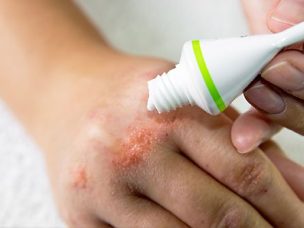Atopic dermatitis
Race Plays Role in Kids' Food Allergies: Study
MONDAY, Feb. 1, 2021 — Black American children have higher rates of shellfish and fish allergies than white children, a new study finds. The research confirms the important role that race plays in children’s food allergies, the study authors said. “Food allergy is a common condition in the U.S., and we know from our previous...
Atopic Comorbidity Up in Children With Food Protein-Induced Enterocolitis
Higher rates seen for atopic dermatitis, IgE-mediated food allergy, asthma, allergic rhinitis Children with food protein-induced enterocolitis syndrome (FPIES) have higher rates of atopic comorbidity, according to a study published online in the March issue of the Journal of Allergy and Clinical Immunology: In Practice. Melanie A. Ruffner, M.D., Ph.D., from the Children’s Hospital of Philadelphia,...
Should Eczema Treatment Plans Vary For Skin Based On Levels of Melanin? Dr. Nada Elbuluk Weighs In
Should Eczema treatments vary based on skin color? It’s a question that many physicians have asked and Dr. Nada Elbuluk of The Skin of Color Society is helping us get to the bottom of things. Here’s what she had to say to MDNewsline about treating eczema in patients of color. MDNewsline: As a dermatologist, can you tell...
S. aureus Agr Virulence Tied to Atopic Dermatitis in Infants
Expression of functional Agr system in S. aureus needed for epidermal colonization in mice Skin colonization by Staphylococcus aureus is associated with the risk for developing atopic dermatitis (AD), and infants who do not develop AD primarily exhibit acquisition of dysfunctional mutations in the S. aureus quorum-sensing system, according to a study published in the July 8 issue of Science Translational...
Dr. Andrew F. Alexis Talks Eczema and Ethnic Skin With MDNewsline
MDNewsline recently interviewed international skin of color expert and dermatologist Dr. Andrew F. Alexis about treating eczema in patients of color. Dr. Alexis is a member of the Skin of Color Society (SOCS) and we thank the SOCS for providing this interview opportunity. MDNewsline: According to the National Eczema Association, 20.2% of African American children in the...
Here's What You Need To Know About Psoriasis With Dr. Hope Mitchell
Diagnosing Psoriasis in patients of color can be tricky. We sat down with Dr. Hope Mitchell to learn more about Psoriasis–how it’s diagnosed, progression, treatments and more. A native of Brooklyn, New York, Dr. Mitchell attended the University of Rochester and graduated with a Bachelor of Arts in Biology. She obtained her doctorate of medicine...
Dr. Michelle Henry Talks Eczema in Patients of Color
Dr. Michelle Henry is a Harvard trained Mohs surgeon and a board-certified dermatologist. She is currently a Clinical Instructor of Dermatology at Weill Cornell Medical College where she practices Mohs micrographic, reconstructive, and cosmetic surgery. Dr. Henry attended medical school at Baylor College of Medicine in Houston, Texas and completed her residency in dermatology at...
Dr. Meena Singh On Treating Eczema In Patients of Color
Dr. Meena Singh is a Harvard Medical School graduate, board-certified dermatologist and dermatologic surgeon in Kansas City who specializes in hair transplant and ethnic skin. She is the Medical Director for KMC Hair Center whose multiple locations include Shawnee, Leawood, and Kansas City. We recently sat down with Dr. Singh to discuss eczema in darker...
Continued Usage of Dupilumab Shows Atopic Dermatitis Treatment Results
Severe atopic dermatitis (AD) produces painful, itchy and unsightly patches that disrupt sleep and have been linked to increased risk of depression. Now researchers have analyzed findings from a randomized follow-up trial in adults from two previous studies (SOLO 1 and SOLO 2) and found that maintenance monotherapy with dupilumab (Dupixent, Regeneron) at 300 mg...
More Medical News














